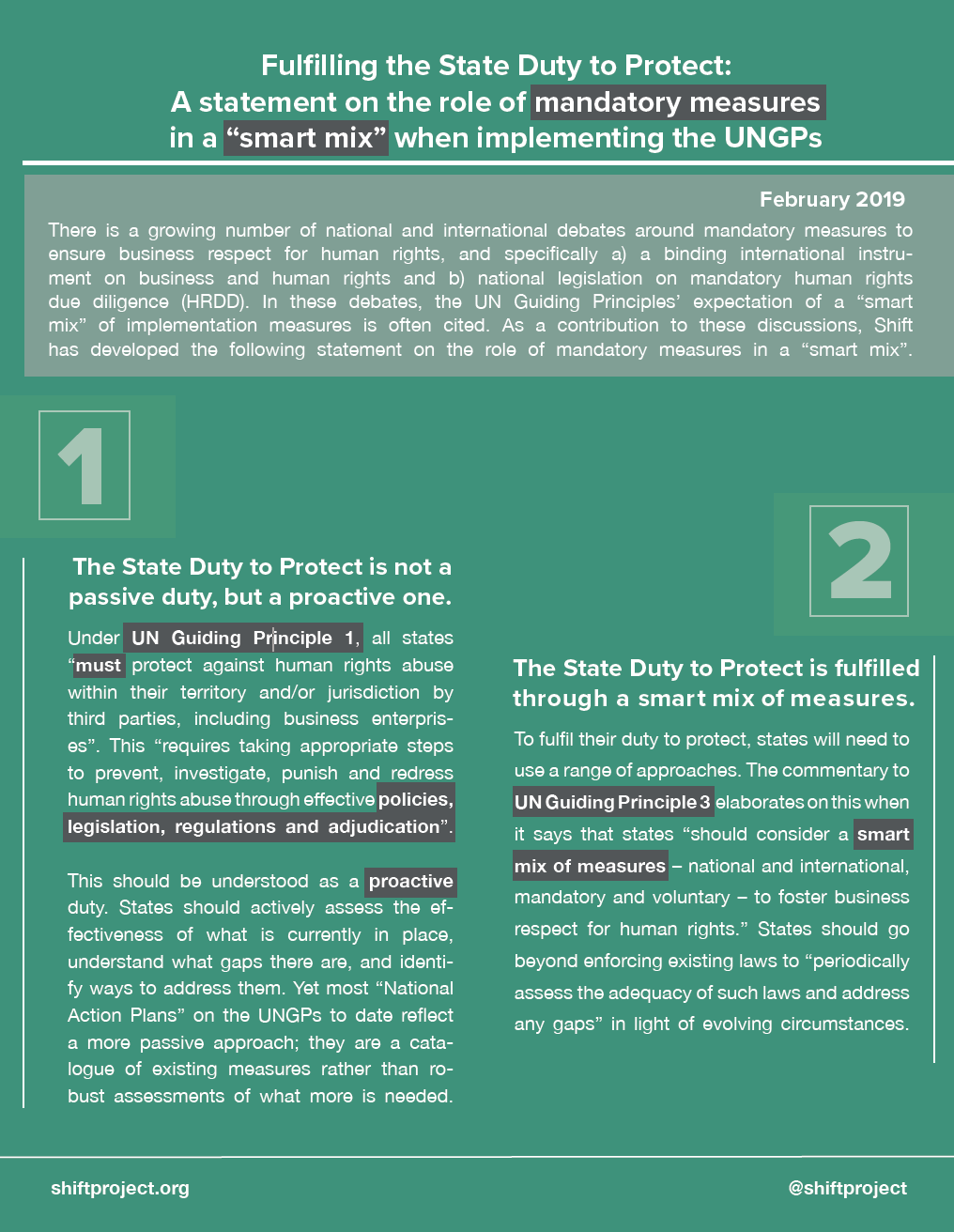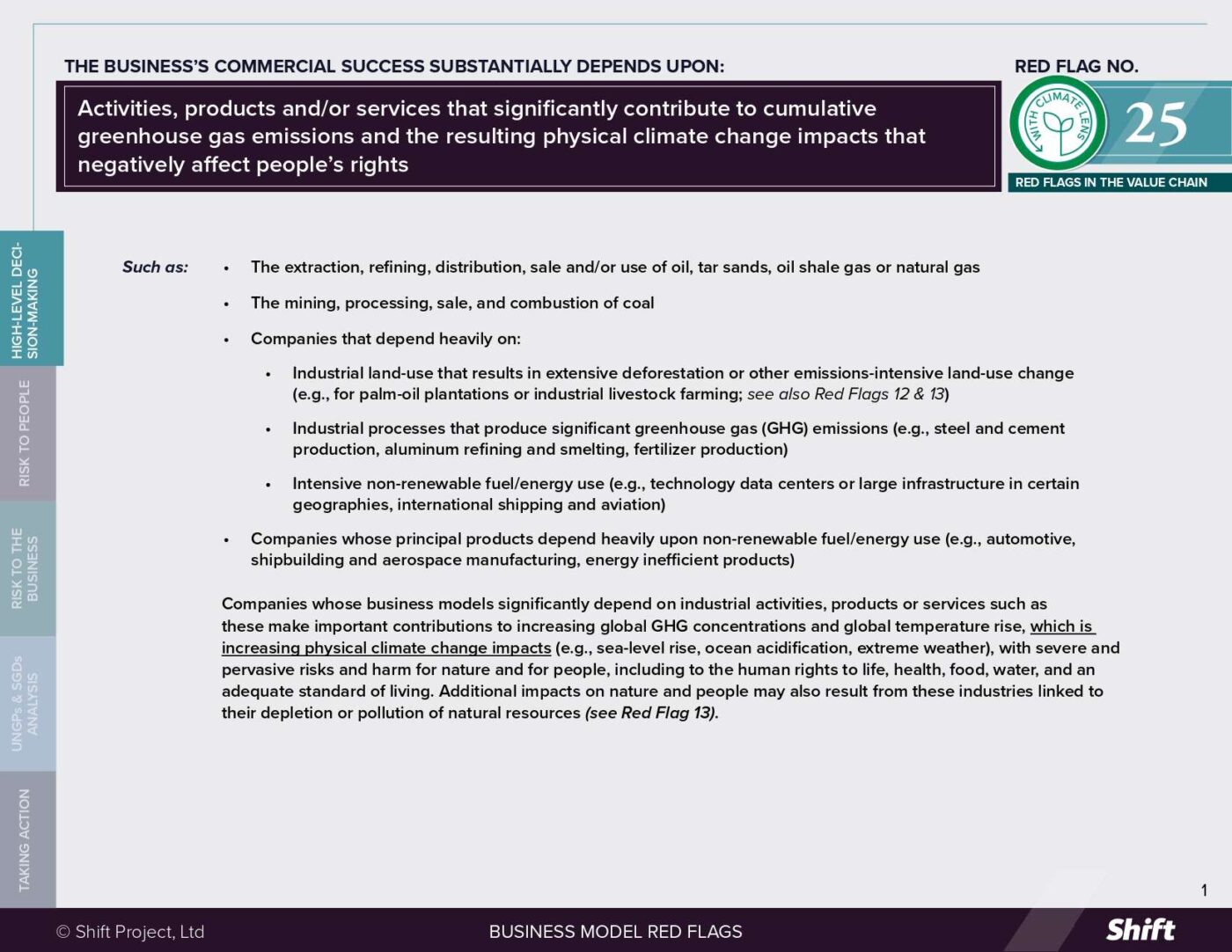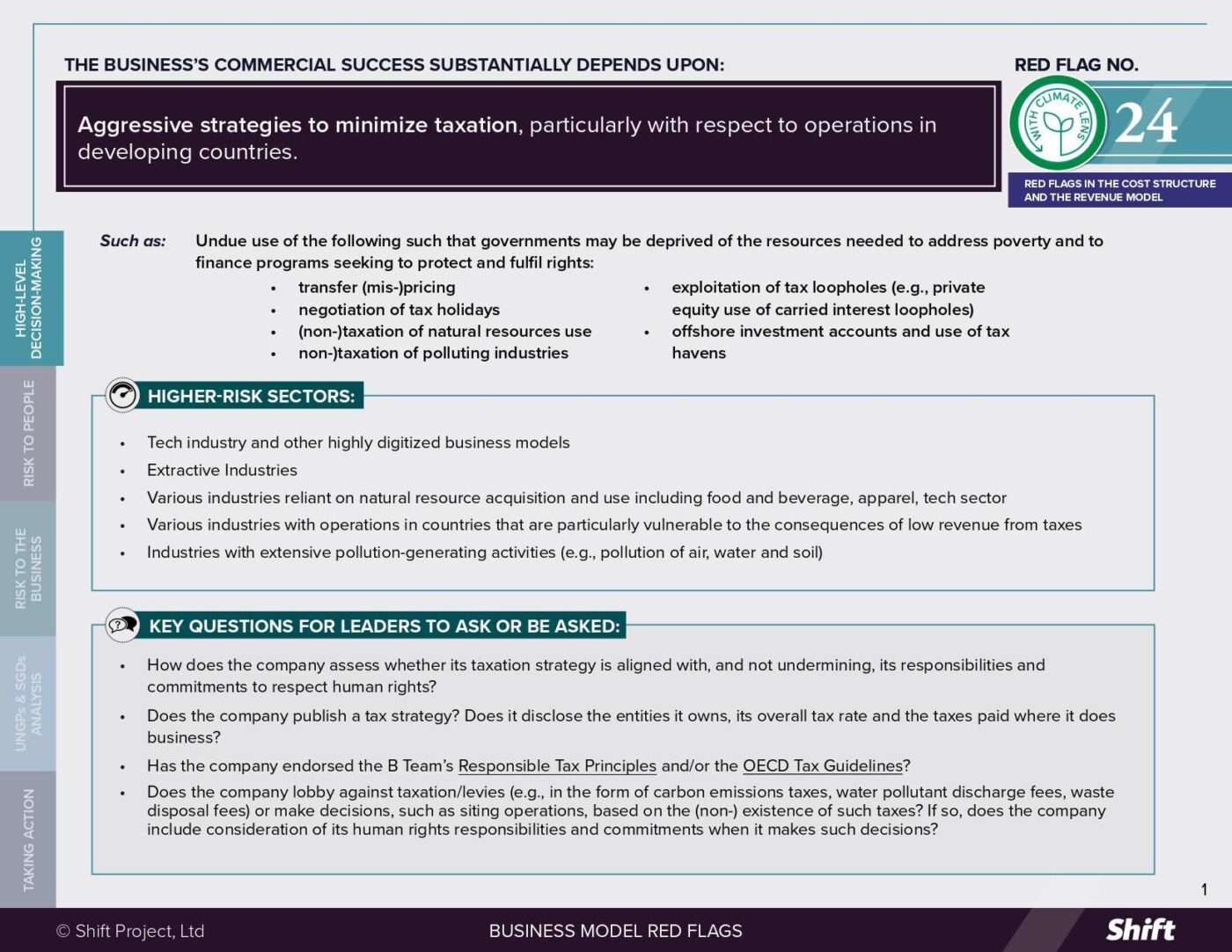PILLAR 1: STATE DUTY TO PROTECT
Foundational Principles
1. States must protect against human rights abuse within their territory and/or jurisdiction by third parties, including business enterprises. This requires taking appropriate steps to prevent, investigate, punish and redress such abuse through effective policies, legislation, regulations and adjudication.
___
Commentary
States’ international human rights law obligations require that they respect, protect and fulfil the human rights of individuals within their territory and/ or jurisdiction. This includes the duty to protect against human rights abuse by third parties, including business enterprises.
The State duty to protect is a standard of conduct. Therefore, States are not per se responsible for human rights abuse by private actors. However, States may breach their international human rights law obligations where such abuse can be attributed to them, or where they fail to take appropriate steps to prevent, investigate, punish and redress private actors’ abuse. While States generally have discretion in deciding upon these steps, they should consider the full range of permissible preventative and remedial measures, including policies, legislation, regulations and adjudication. States also have the duty to protect and promote the rule of law, including by taking measures to ensure equality before the law, fairness in its application, and by providing for adequate accountability, legal certainty, and procedural and legal transparency. This chapter focuses on preventative measures while chapter III outlines remedial measures.
2. States should set out clearly the expectation that all business enterprises domiciled in their territory and/or jurisdiction respect human rights throughout their operations.
___
Commentary
At present States are not generally required under international human rights law to regulate the extraterritorial activities of businesses domiciled in their territory and/or jurisdiction. Nor are they generally prohibited from doing so, provided there is a recognized jurisdictional basis. Within these parameters some human rights treaty bodies recommend that home States take steps to prevent abuse abroad by business enterprises within their jurisdiction.
There are strong policy reasons for home States to set out clearly the expectation that businesses respect human rights abroad, especially where the State itself is involved in or supports those businesses. The reasons include ensuring predictability for business enterprises by providing coherent and consistent messages, and preserving the State’s own reputation.
States have adopted a range of approaches in this regard. Some are domestic measures with extraterritorial implications. Examples include requirements on “parent” companies to report on the global operations of the entire enterprise; multilateral soft-law instruments such as the Guidelines for Multinational Enterprises of the Organisation for Economic Co-operation and Development; and performance standards required by institutions that support overseas investments. Other approaches amount to direct extraterritorial legislation and enforcement. This includes criminal regimes that allow for prosecutions based on the nationality of the perpetrator no matter where the offence occurs. Various factors may contribute to the perceived and actual reasonableness of States’ actions, for example whether they are grounded in multilateral agreement.
Operational Principles
General State Regulatory and Policy Functions
3. In meeting their duty to protect, States should:
(a) Enforce laws that are aimed at, or have the effect of, requiring business enterprises to respect human rights, and periodically to assess the adequacy of such laws and address any gaps;
(b) Ensure that other laws and policies governing the creation and ongoing operation of business enterprises, such as corporate law, do not constrain but enable business respect for human rights;
(c) Provide effective guidance to business enterprises on how to respect human rights throughout their operations;
(d) Encourage, and where appropriate require, business enterprises to communicate how they address their human rights impacts.
___
Commentary
States should not assume that businesses invariably prefer, or benefit from, State inaction, and they should consider a smart mix of measures – national and international, mandatory and voluntary – to foster business respect for human rights.
The failure to enforce existing laws that directly or indirectly regulate business respect for human rights is often a significant legal gap in State practice. Such laws might range from non-discrimination and labour laws to environmental, property, privacy and anti-bribery laws. Therefore, it is important for States to consider whether such laws are currently being enforced effectively, and if not, why this is the case and what measures may reasonably correct the situation.
It is equally important for States to review whether these laws provide the necessary coverage in light of evolving circumstances and whether, together with relevant policies, they provide an environment conducive to business respect for human rights. For example, greater clarity in some areas of law and policy, such as those governing access to land, including entitlements in relation to ownership or use of land, is often necessary to protect both rights-holders and business enterprises.
Laws and policies that govern the creation and ongoing operation of business enterprises, such as corporate and securities laws, directly shape business behaviour. Yet their implications for human rights remain poorly understood. For example, there is a lack of clarity in corporate and securities law regarding what companies and their officers are permitted, let alone required, to do regarding human rights. Laws and policies in this area should provide sufficient guidance to enable enterprises to respect human rights, with due regard to the role of existing governance structures such as corporate boards.
Guidance to business enterprises on respecting human rights should indicate expected outcomes and help share best practices. It should advise on appropriate methods, including human rights due diligence, and how to consider effectively issues of gender, vulnerability and/or marginalization, recognizing the specific challenges that may be faced by indigenous peoples, women, national or ethnic minorities, religious and linguistic minorities, children, persons with disabilities, and migrant workers and their families.
National human rights institutions that comply with the Paris Principles have an important role to play in helping States identify whether relevant laws are aligned with their human rights obligations and are being effectively enforced, and in providing guidance on human rights also to business enterprises and other non-State actors.
Communication by business enterprises on how they address their human rights impacts can range from informal engagement with affected stakeholders to formal public reporting. State encouragement of, or where appropriate requirements for, such communication are important in fostering respect for human rights by business enterprises. Incentives to communicate adequate information could include provisions to give weight to such self-reporting in the event of any judicial or administrative proceeding. A requirement to communicate can be particularly appropriate where the nature of business operations or operating contexts pose a significant risk to human rights. Policies or laws in this area can usefully clarify what and how businesses should communicate, helping to ensure both the accessibility and accuracy of communications.
Any stipulation of what would constitute adequate communication should take into account risks that it may pose to the safety and security of individuals and facilities; legitimate requirements of commercial confidentiality; and variations in companies’ size and structures.
Financial reporting requirements should clarify that human rights impacts in some instances may be “material” or “significant” to the economic performance of the business enterprise.
THE STATE-BUSINESS NEXUS
4. States should take additional steps to protect against human rights abuses by business enterprises that are owned or controlled by the State, or that receive substantial support and services from State agencies such as export credit agencies and official investment insurance or guarantee agencies, including, where appropriate, by requiring human rights due diligence.
___
Commentary
States individually are the primary duty-bearers under international human rights law, and collectively they are the trustees of the international human rights regime. Where a business enterprise is controlled by the State or where its acts can be attributed otherwise to the State, an abuse of human rights by the business enterprise may entail a violation of the State’s own international law obligations. Moreover, the closer a business enterprise is to the State, or the more it relies on statutory authority or taxpayer support, the stronger the State’s policy rationale becomes for ensuring that the enterprise respects human rights.
Where States own or control business enterprises, they have greatest means within their powers to ensure that relevant policies, legislation and regulations regarding respect for human rights are implemented. Senior management typically reports to State agencies, and associated government departments have greater scope for scrutiny and oversight, including ensuring that effective human rights due diligence is implemented. (These enterprises are also subject to the corporate responsibility to respect human rights, addressed in chapter II.)
A range of agencies linked formally or informally to the State may provide support and services to business activities. These include export credit agencies, official investment insurance or guarantee agencies, development agencies and development finance institutions. Where these agencies do not explicitly consider the actual and potential adverse impacts on human rights of beneficiary enterprises, they put themselves at risk – in reputational, financial, political and potentially legal terms – for supporting any such harm, and they may add to the human rights challenges faced by the recipient State.
Given these risks, States should encourage and, where appropriate, require human rights due diligence by the agencies themselves and by those business enterprises or projects receiving their support. A requirement for human rights due diligence is most likely to be appropriate where the nature of business operations or operating contexts pose significant risk to human rights.
5. States should exercise adequate oversight in order to meet their international human rights obligations when they contract with, or legislate for, business enterprises to provide services that may impact upon the enjoyment of human rights.
___
Commentary
States do not relinquish their international human rights law obligations when they privatize the delivery of services that may impact upon the enjoyment of human rights. Failure by States to ensure that business enterprises performing such services operate in a manner consistent with the State’s human rights obligations may entail both reputational and legal consequences for the State itself. As a necessary step, the relevant service contracts or enabling legislation should clarify the State’s expectations that these enterprises respect human rights. States should ensure that they can effectively oversee the enterprises’ activities, including through the provision of adequate independent monitoring and accountability mechanisms.
6. States should promote respect for human rights by business enterprises with which they conduct commercial transactions.
___
Commentary
States conduct a variety of commercial transactions with business enterprises, not least through their procurement activities. This provides States – individually and collectively – with unique opportunities to promote awareness of and respect for human rights by those enterprises, including through the terms of contracts, with due regard to States’ relevant obligations under national and international law.
SUPPORTING BUSINESS RESPECT FOR HUMAN RIGHTS IN CONFLICT-AFFECTED AREAS
7. Because the risk of gross human rights abuses is heightened in conflict-affected areas, States should help ensure that business enterprises operating in those contexts are not involved with such abuses, including by:
(a) Engaging at the earliest stage possible with business enterprises to help them identify, prevent and mitigate the human rights-related risks of their activities and business relationships;
(b) Providing adequate assistance to business enterprises to assess and address the heightened risks of abuses, paying special attention to both gender-based and sexual violence;
(c) Denying access to public support and services for a business enterprise that is involved with gross human rights abuses and refuses to cooperate in addressing the situation;
(d) Ensuring that their current policies, legislation, regulations and enforcement measures are effective in addressing the risk of business involvement in gross human rights abuses.
___
Commentary
Some of the worst human rights abuses involving business occur amid conflict over the control of territory, resources or a Government itself –where the human rights regime cannot be expected to function as intended. Responsible businesses increasingly seek guidance from States about how to avoid contributing to human rights harm in these difficult contexts. Innovative and practical approaches are needed. In particular, it is important to pay attention to the risk of sexual and gender-based violence, which is especially prevalent during times of conflict.
It is important for all States to address issues early before situations on the ground deteriorate. In conflict-affected areas, the “host” State may be unable to protect human rights adequately due to a lack of effective control. Where transnational corporations are involved, their “home” States therefore have roles to play in assisting both those corporations and host States to ensure that businesses are not involved with human rights abuse, while neighboring States can provide important additional support.
To achieve greater policy coherence and assist business enterprises adequately in such situations, home States should foster closer cooperation among their development assistance agencies, foreign and trade ministries, and export finance institutions in their capitals and within their embassies, as well as between these agencies and host Government actors; develop early-warning indicators to alert government agencies and business enterprises to problems; and attach appropriate consequences to any failure by enterprises to cooperate in these contexts, including by denying or withdrawing existing public support or services, or where that is not possible, denying their future provision.
States should warn business enterprises of the heightened risk of being involved with gross abuses of human rights in conflict-affected areas. They should review whether their policies, legislation, regulations and enforcement measures effectively address this heightened risk, including through provisions for human rights due diligence by business. Where they identify gaps, States should take appropriate steps to address them.
This may include exploring civil, administrative or criminal liability for enterprises domiciled or operating in their territory and/or jurisdiction that commit or contribute to gross human rights abuses. Moreover, States should consider multilateral approaches to prevent and address such acts, as well as support effective collective initiatives.
All these measures are in addition to States’ obligations under international humanitarian law in situations of armed conflict, and under international criminal law.
ENSURING POLICY COHERENCE
8. States should ensure that governmental departments, agencies and other State-based institutions that shape business practices are aware of and observe the State’s human rights obligations when fulfilling their respective mandates, including by providing them with relevant information, training and support.
___
Commentary
There is no inevitable tension between States’ human rights obligations and the laws and policies they put in place that shape business practices. However, at times, States have to make difficult balancing decisions to reconcile different societal needs. To achieve the appropriate balance, States need to take a broad approach to managing the business and human rights agenda, aimed at ensuring both vertical and horizontal domestic policy coherence.
Vertical policy coherence entails States having the necessary policies, laws and processes to implement their international human rights law obligations. Horizontal policy coherence means supporting and equipping departments and agencies, at both the national and subnational levels, that shape business practices – including those responsible for corporate law and securities regulation, investment, export credit and insurance, trade and labour – to be informed of and act in a manner compatible with the Governments’ human rights obligations.
9. States should maintain adequate domestic policy space to meet their human rights obligations when pursuing business-related policy objectives with other States or business enterprises, for instance through investment treaties or contracts.
___
Commentary
Economic agreements concluded by States, either with other States or with business enterprises – such as bilateral investment treaties, free trade agreements or contracts for investment projects – create economic opportunities for States. But they can also affect the domestic policy space of Governments. For example, the terms of international investment agreements may constrain States from fully implementing new human rights legislation, or put them at risk of binding international arbitration if they do so. Therefore, States should ensure that they retain adequate policy and regulatory ability to protect human rights under the terms of such agreements, while providing the necessary investor protection.
10. States, when acting as members of multilateral institutions that deal with business-related issues, should:
(a) Seek to ensure that those institutions neither restrain the ability of their member States to meet their duty to protect nor hinder business enterprises from respecting human rights;
(b) Encourage those institutions, within their respective mandates and capacities, to promote business respect for human rights and, where requested, to help States meet their duty to protect against human rights abuse by business enterprises, including through technical assistance, capacity-building and awareness-raising;
(c) Draw on these Guiding Principles to promote shared understanding and advance international cooperation in the management of business and human rights challenges.
___
Commentary
Greater policy coherence is also needed at the international level, including where States participate in multilateral institutions that deal with business related issues, such as international trade and financial institutions. States retain their international human rights law obligations when they participate in such institutions.
Capacity-building and awareness-raising through such institutions can play a vital role in helping all States to fulfil their duty to protect, including by enabling the sharing of information about challenges and best practices, thus promoting more consistent approaches.
Collective action through multilateral institutions can help States level the playing field with regard to business respect for human rights, but it should do so by raising the performance of laggards. Cooperation between States, multilateral institutions and other stakeholders can also play an important role.
These Guiding Principles provide a common reference point in this regard, and could serve as a useful basis for building a cumulative positive effect that takes into account the respective roles and responsibilities of all relevant stakeholders.





